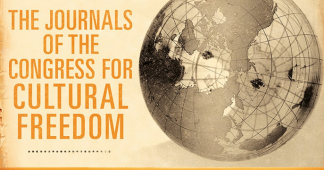The Paradox of Freedom: The Great Humanistic Philosopher and Psychologist Erich Fromm on Moral Aloneness and Our Mightiest Antidote to Terror
“Modern man still is anxious and tempted to surrender his freedom to dictators of all kinds, or to lose it by transforming himself into a small cog in the machine.”
“Freedom is not something that anybody can be given,” James Baldwin wrote in contemplating how we imprison ourselves, “freedom is something people take and people are as free as they want to be.” It is hard not to instinctually bristle at this notion — we all like to see ourselves as autonomous agents of our own destiny who would never willfully relinquish our freedom. And yet we do — beyond the baseline laws of physics and their perennially disquieting corollary regarding free will, which presupposes that even the nature of the faculty doing the relinquishing is not the sovereign entity we wish it were, we are governed by myriad ideological, social, economic, political, and psychological forces that mitigate the parameters of our freedom. Neuroscientist Christoph Koch put it perfectly in his treatise on free will: “Freedom is always a question of degree rather than an absolute good that we do or do not possess.”
What determines the degree to which we are free is what the great German humanistic philosopher and psychologist Erich Fromm (March 23, 1900–March 18, 1980) explores in his first major work, the prescient 1941 treasure Escape from Freedom (public library) — a book Fromm deems “a diagnosis rather than a prognosis,” written during humanity’s grimmest descent into madness in WWII, laying out the foundational ideas on which Fromm would later draw in considering the basis of a sane society.
At the heart of Fromm’s thesis is the notion that freedom is a diamagnetic force — by one pole, it compels us to escape to it, which Fromm calls positive freedom; by the other, it drives us to escape from it, a manifestation of negative freedom. While modern civilization has liberated human beings in a number of practical ways and has furnished us with various positive freedoms, its psychological impacts has given rise to an epidemic of negative freedom. Fromm writes:
“Modern man, freed from the bonds of pre-individualistic society, which simultaneously gave him security and limited him, has not gained freedom in the positive sense of the realization of his individual self; that is, the expression of his intellectual, emotional and sensuous potentialities. Freedom, though it has brought him independence and rationality, has made him isolated and, thereby, anxious and powerless. This isolation is unbearable and the alternatives he is confronted with are either to escape from the burden of his freedom into new dependencies and submission, or to advance to the full realization of positive freedom which is based upon the uniqueness and individuality of man.”
A decade before Hannah Arendt examined how tyrants use isolation and alienation as a weapon of oppression in her classic treatise on the origins of totalitarianism, Fromm writes:
‘”The understanding of the reasons for the totalitarian flight from freedom is a premise for any action which aims at the victory over the totalitarian forces.”
In a foreword penned a quarter century after the book’s initial publication, Fromm adds a sentiment of chilling resonance today, yet another half-century later:
“Modern man still is anxious and tempted to surrender his freedom to dictators of all kinds, or to lose it by transforming himself into a small cog in the machine, well fed, and well clothed, yet not a free man but an automaton.”
Writing in an era when man contained every woman as well, Fromm considers the seedbed of our surrender:
“The crucial difficulty with which we are confronted lies in the fact that the development of man’s intellectual capacities has far outstripped the development of his emotions. Man’s brain lives in the twentieth century; the heart of most men lives still in the Stone Age. The majority of men have not yet acquired the maturity to be independent, to be rational, to be objective. They need myths and idols to endure the fact that man is all by himself, that there is no authority which gives meaning to life except man himself. Man represses the irrational passions of destructiveness, hate, envy, revenge; he worships power, money, the sovereign state, the nation; while he pays lip service to the teachings of the great spiritual leaders of the human race, those of Buddha, the prophets, Socrates, Jesus, Mohammed — he has transformed these teachings into a jungle of superstition and idol-worship.”
The only way humanity can save itself, Fromm argues, is by addressing this disconnect between our “intellectual-technical overmaturity and emotional backwardness.” He considers the task before us:
“As far as I can see there is only one answer: the increasing awareness of the most essential facts of our social existence, an awareness sufficient to prevent us from committing irreparable follies, and to raise to some small extent our capacity for objectivity and reason. We can not hope to overcome most follies of the heart and their detrimental influence on our imagination and thought in one generation; maybe it will take a thousand years until man has lifted himself from a pre-human history of hundreds of thousands of years. At this crucial moment, however, a modicum of increased insight — objectivity — can make the difference between life and death for the human race. For this reason the development of a scientific and dynamic social psychology is of vital importance. Progress in social psychology is necessary to counteract the dangers which arise from the progress in physics and medicine.”
With an eye to the unbearable moral question of the Holocaust — what made millions cooperative and complicit with the murder of millions — Fromm points out that many people chose to answer it with convenient rationalizations: that it was only “the madness of a few individuals”; or that particular nations, such as Germans and Italians, were especially susceptible to mass manipulation due to a lack of sufficiently long training in democracy; or that Hitler and his pawns gained power over the masses using only trickery and brute force. These, Fromm admonishes, are dangerous delusions that preclude us from confronting the heart of the problem and thus disable us from preventing future outbreaks of inhumanity. He writes in the foreword to the 1965 edition:
“In the years that have elapsed since [the Holocaust], the fallacy of these arguments has become apparent. We have been compelled to recognize that millions in Germany were as eager to surrender their freedom as their fathers were to fight for it; that instead of wanting freedom, they sought for ways of escape from it; that other millions were indifferent and did not believe the defense of freedom to be worth fighting and dying for. We also recognize that the crisis of democracy is not a peculiarly Italian or German problem, but one confronting every modern state. Nor does it matter which symbols the enemies of human freedom choose: freedom is not less endangered if attacked in the name of anti-Fascism than in that of outright Fascism.”
In consonance with Baldwin’s assertion that “one hasn’t got to have an enormous military machine in order to be un-free when it’s simpler to be asleep, when it’s simpler to be apathetic, when it’s simpler, in fact, not to want to be free,” Fromm examines the paradoxical nature of freedom:
“Is there not also, perhaps, besides an innate desire for freedom, an instinctive wish for submission? If there is not, how can we account for the attraction which submission to a leader has for so many today? Is submission always to an overt authority, or is there also submission to internalized authorities, such as duty or conscience, to inner compulsions or to anonymous authorities like public opinion? Is there a hidden satisfaction in submitting, and what is its essence? What is it that creates in men an insatiable lust for power? Is it the strength of their vital energy — or is it a fundamental weakness and inability to experience life spontaneously and lovingly? What are the psychological conditions that make for the strength of these strivings? What are the social conditions upon which such psychological conditions in turn are based?”
The answer, Fromm argues, lies in understanding “the interaction of psychological, economic, and ideological factors in the social process.” In the same year when the young Alan Watts told his parents that “there is a universe inside one, which contains Hitler and all forms of human madness as well as love and beauty,” Fromm counters Freud’s insistence on a static human nature and writes:
“The most beautiful as well as the most ugly inclinations of man are not part of a fixed and biologically given human nature, but result from the social process which creates man. In other words, society has not only a suppressing function — although it has that too — but it has also a creative function. Man’s nature, his passions, and anxieties are a cultural product; as a matter of fact, man himself is the most important creation and achievement of the continuous human effort, the record of which we call history.
[…]
But man is not only made by history — history is made by man. The solution of this seeming contradiction constitutes the field of social psychology. Its task is to show not only how passions, desires, anxieties change and develop as a result of the social process, but also how man’s energies thus shaped into specific forms in their turn become productive forces, molding the social process… Though there is no fixed human nature, we cannot regard human nature as being infinitely malleable and able to adapt itself to any kind of conditions without developing a psychological dynamism of its own. Human nature, though being the product of historical evolution, has certain inherent mechanisms and laws, to discover which is the task of psychology.”
The root of negative freedom, Fromm observes, is our increasing sense of alienation, which leaves unnourished our elemental hunger for connection to the world beyond ourselves. Presaging the modern epidemic of collective loneliness, he writes:
“To feel completely alone and isolated leads to mental disintegration just as physical starvation leads to death. This relatedness to others is not identical with physical contact. An individual may be alone in a physical sense for many years and yet he may be related to ideas, values, or at least social patterns that give him a feeling of communion and “belonging.” On the other hand, he may live among people and yet be overcome with an utter feeling of isolation, the outcome of which, if it transcends a certain limit, is the state of insanity which schizophrenic disturbances represent. This lack of relatedness to values, symbols, patterns, we may call moral aloneness and state that moral aloneness is as intolerable as the physical aloneness, or rather that physical aloneness becomes unbearable only if it implies also moral aloneness… Religion and nationalism, as well as any custom and any belief however absurd and degrading, if it only connects the individual with others, are refuges from what man most dreads: isolation.”
Fromm considers our two great antidotes to the alienation of moral aloneness — love and work:
“There is only one possible, productive solution for the relationship of individualized man with the world: his active solidarity with all men and his spontaneous activity, love and work, which unite him again with the world, not by primary ties but as a free and independent individual.
However, if the economic, social and political conditions on which the whole process of human individuation depends, do not offer a basis for the realization of individuality in the sense just mentioned, while at the same time people have lost those ties which gave them security, this lag makes freedom an unbearable burden. It then becomes identical with doubt, with a kind of life which lacks meaning and direction. Powerful tendencies arise to escape from this kind of freedom into submission or some kind of relationship to man and the world which promises relief from uncertainty, even if it deprives the individual of his freedom.”
How to counter the forces that make for negative freedom and amplify those that make for positive freedom is what Fromm investigates in the remainder of Escape from Freedom. Complement it with Simone de Beauvoir on what freedom really means and mathematician Lillian Lieber, of whom Einstein was an ardent admirer, on our basic misconception about freedom, then revisit Fromm on the art of living, the art of loving, how to transcend the common laziness of optimism and pessimism, the six rules of listening and unselfish understanding, and the key to a sane society.
Photo:Art by Olivier Tallec from This Is a Poem That Heals Fish by Jean-Pierre Simeón
Published at https://www.brainpickings.org/2018/04/17/erich-fromm-escape-from-freedom/











